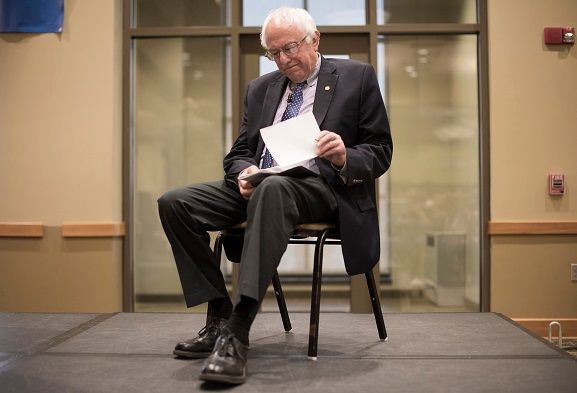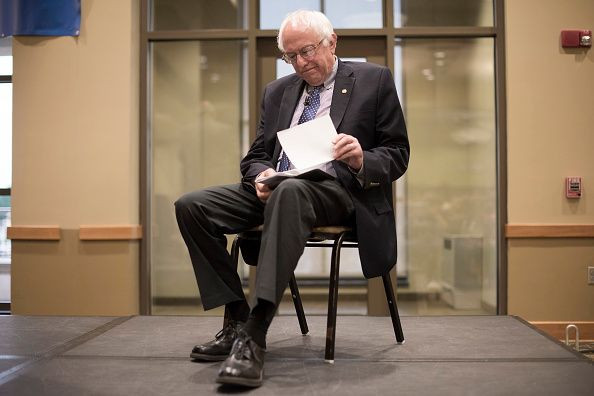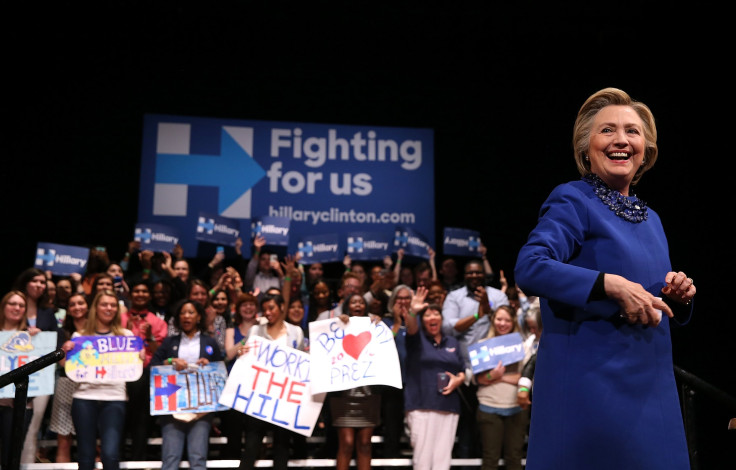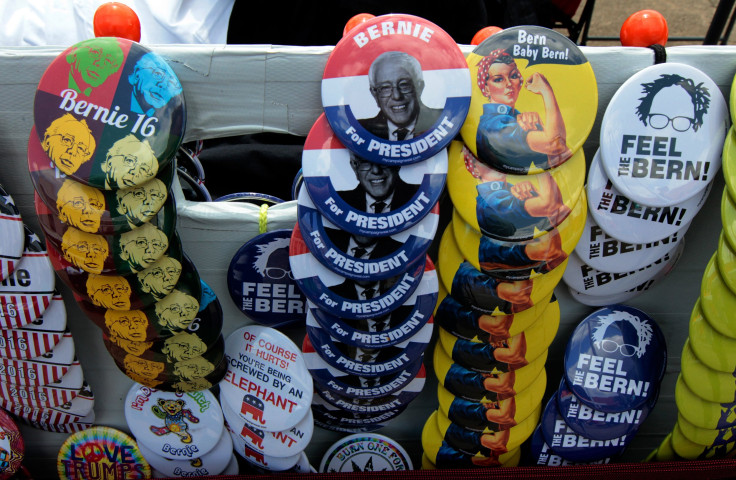Election 2016: Why Did Bernie Sanders Run? How The Sanders Revolution Changed As The Democratic Primaries Went On

Last week, the Bernie Sanders campaign's seven-state winning streak came to a crashing halt in New York. The night was over early, but Sanders marched on; 90 minutes after the polls closed, senior adviser Tad Devine said the campaign would "assess where we are" the following week, after another round of voting in Northeastern primary states.
That round of voting is over now. Here's where we are: Sanders had another bad night. He claimed Rhode Island, but front-runner Hillary Clinton marched closer to the 2,383 delegates she needs to clinch the nomination. The Democratic nomination race may be just about over.

Of course, Bernie Sanders and his advocates have always described his political project as far more than a campaign. It was supposed to be a movement, a "political revolution," to use one of the candidate's favorite expressions. But revolutions can take years, and movements are rarely tethered to a single campaign cycle. If Clinton locks up the nomination soon, it seems unlikely that the Sanders phenomenon will continue without its candidate.
Perhaps that's because there is very little holding the Sanders coalition together besides the candidate himself. Though he still commands an army of ardent supporters, an examination of Sanders' comments shows that the campaign abandoned its grand theory of change months ago.

When he entered the race, Sanders argued that a message of economic populism could unify the politically fissured working class and build a new Democratic majority. He envisioned a social democratic America, held together by an egalitarian consensus that transcended geographic and racial divisions.
That consensus, he argued, was what would get him elected and guarantee the success of his presidency. He could draw in disaffected working people, cause voter turnout to spike precipitously, and ride the wave into office. Not only that, but the increased turnout would transform the composition of the legislative branch; even some Republicans in Congress would acquiesce to the Sanders administration's proposals, for fear of the middle-class and working-class constituents who would punish intransigence in the next election.
As early as 2013, Sanders was arguing that progressives needed to reach working-class voters in all 50 states. That was the year he went on a tour of the South and told the magazine In These Times that he rejected "this concept that there's a blue state and red state America."
"I believe that in every state in the country the vast majority of the people are working people. These are people who are struggling to keep their heads above water economically, these are people who want Social Security defended, they want to raise the minimum wage, they want changes in our trade policy," said Sanders. "And to basically concede significant parts of America, including the South, to the right wing is to me not only stupid politics, but even worse than that — you just do not turn your backs on millions and millions of working people."
Then came the Democratic primaries, two and a half years later. When Clinton routed him in South Carolina and went on to sweep the rest of the South, Sanders quickly jettisoned the rhetoric about mobilizing workers in all 50 states. Campaign strategist Tad Devine told reporters in late March that Sanders had chosen to "not compete" in most Southern states.

"Almost all of Secretary Clinton's delegate lead comes from states where she faced little or no competition," said Devine on a press call. Those states purportedly included Georgia, Louisiana, Mississippi and Texas.
Sanders later waved away his losses in the South by describing the region as "the most conservative part of this great country." In fact, Southern Democratic primary voters aren't significantly more conservative than the party as a whole, and are, in large numbers, black.
But even if Democratic voters in red states did tend to be more conservative, that wouldn't explain why Clinton won the South and Sanders did not. After all, Sanders has claimed such Republican fortresses as Kansas, Oklahoma and Wyoming. The bigger difference between a state like Kansas and a state like Louisiana is that Kansas allocates its delegates through a caucus system rather than popular vote. Plus, the Democratic electorate in Kansas is a lot whiter.
The Sanders campaign's next reversal cut even closer to the rationale for his whole campaign. Earlier this week, he chalked up his failure to win the country's most economically unequal states to the claim that "poor people don't vote." It was a stark admission, given that his entire theory of political revolution depended on mobilizing the poor and working class who are so often left out of the process.
"That's the sad reality of American society, and that's what we have to transform. We have, as you know, one of the lowest voter turnouts of any major country on earth," said Sanders.

His candidacy, and his political revolution, weren't able to change that.
Now Sanders appears no longer to be counting on voter mobilization. After polls closed on Tuesday night, he made an direct appeal to Democratic delegates in a West Virginia campaign speech. The delegates should support him at the Democratic convention in July, he argued, because he is better positioned to defeat Republican front-runner Donald Trump in the general election.
"That is a point I hope that the delegates to the Democratic convention fully understand," said Sanders. "In a general election, everyone, Democrat, independent, Republican, has the right to vote for president. The elections are not closed primaries."
The other precondition for the planned political revolution: a big change to the way Congress does business. Sanders said as much in his interview with the New York Daily News editorial board earlier this month, when they asked how he would implement his agenda as president.
"First of all, if I win, it will almost by definition mean that there will be a very large voter turnout. That's what I believe. If there is a very large voter turnout, I think the odds are pretty strong Democrats will regain control of the Senate, do better in the House. Can they win the House? I don't know. But they will do better," said Sanders.
But he hasn't done much to help this element of the revolution come to pass, especially as relations between his campaign and the Democratic National Committee soured. While Clinton has raised millions for candidates in down-ballot races, Sanders has taken a more desultory approach.
When asked in late March whether he would at some point raise money for Democrats, Sanders replied, "We'll see." Two weeks later, he issued fundraising emails on behalf of three House candidates.
Without a concerted effort to boost down-ticket candidates, get poor people to the polls, or change the politics of the South, what remains looks less like movement-building than just another long-shot protest candidacy. That doesn't diminish Sanders's very real accomplishments. His campaign has successfully mobilized younger voters, built a colossal grassroots fundraising operation, helped shape the party's key issues and his rival's economic views, proved that it's possible to run a major presidential campaign without courting billionaire donors, and gotten a lot further than any comparable outsider candidate in recent history. But those achievements don't add up to a revolution.
Without a clear path to victory for Sanders, or a broader movement into which they can channel their energies, some of his grassroots backers have sounded downright despairing in media interviews. "I hate to say it, but I feel like I'm putting my head in a bag and just crossing my fingers," one Connecticut Sanders fan told the New York Times in an article that ran Tuesday morning.
There are ways that Sanders could have an impact beyond the primary. Progressive groups are eager to get hold of his fundraising list, of course. And the New York Times reports that Sanders aides "have been pressing for a significant role in drafting the platform for the Democratic convention," although the platform is largely a symbolic document.
But the modest, prosaic quality of his expected impact stands in stark contrast to the grandeur of his initial vision.
© Copyright IBTimes 2024. All rights reserved.






















